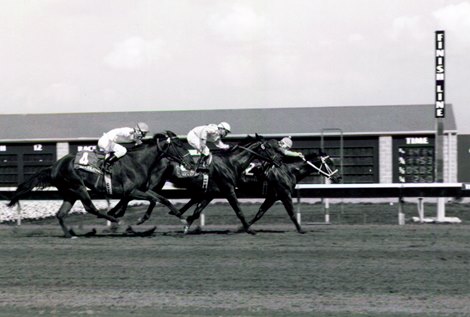The state of Kansas has approved 1,000 historical horse racing machines, which is a precursor to the return of Thoroughbred racing in the state. While Kansas has not had live Thoroughbred racing since 2008, the goal is for the sport to return in the fall of 2026 and potentially expand after 2028.
If everything goes according to plan, Eureka Downs in Eureka, Kan., will have horses in its starting gate less than a year from now. But there is much work to be done until that can happen.
The track closed in 2011, but thanks to a coalition of local entities, including the owners, the Greenwood County Fair Board came together with a plan to revitalize the facility to serve the community with more than racing.
"As far as live horse racing at Eureka happening in 2026, that is what we're hoping for," said Kansas Racing and Gaming Commission government relations manager Randy Evans. "Right now, the owners of the track still have a lot of work (to do). The track's not ready right now, and they are in the process of trying to get that track ready to, in fact, run live horse races at Eureka Downs."
With the state not having had live racing in several years, it required capital investment to start the process of getting Eureka Downs in condition to host racing. The state budgeted $2 million toward renovating the track, which also benefited from countless volunteers working to clean up the venue as well as high school carpentry students building offices, according to the Eureka Herald newspaper.
Peach Madl, the executive director of the Kansas Thoroughbred Association, said that the $2 million allocated by the state was expected to be paid back, but Eureka Downs received a $1 million grant that allowed the work to begin.
She said among the efforts underway, guided by new track general manager Mike Weiss, will be installing a new racing surface.
The state approved Eureka Downs for up to 44 days of racing, but it is starting conservatively with 10-16 days initially.
But money to support the industry will come from the statute signed by Gov. Laura Kelly. The HHR machines will provide 3% of their gross revenue to two horse racing funds, with 30% going to the Kansas Horse Breeding Development Fund and 70% going to the Fair Horse Racing Benefit Fund, which will provide for purse supplements, capital improvements, and operating expenditures.
"We'll have more days, because there's going to be more money than can be spent," Madl said. "If you take the predictions of the 1,000 HHR machines, it's going to be millions and millions (of dollars)."

The HHR machines will be located at an entertainment venue called Gilley's in Park City, Kan., about an hour west of Eureka. Businessman Phil Ruffin, who owns Gilley's, unsuccessfully tried to reopen The Woodlands racetrack in Kansas City. Gilley's will have its grand opening Dec. 15.
But with the HHR machines and the ability to simulcast, Ruffin is in a position to help generate money for the industry.
"We didn't hear anything for several years (after the failed Woodlands efforts) and then we started hearing about the success of HHR machines," Madl said. "It is the Ruffin family, (they) have been working on this for years. It went through the legislature in '24, very high approval. The governor vetoed it because it missed a way to fund enforcement on it, and so we had to run it back through. And then she signed it in July."
Without HHR, there is no racing. Without racing, there's no HHR.
"HHR got the backing of the horse people once they realized 3% tax on potentially millions of dollars could really supplement the horse racing industry," Evans said.
There could be more on the way.
All of this started, at least from a legislative perspective, with Kansas legalizing sports betting in 2022. That state law allowed for the 1,000 HHR machines only in Sedgwick County, which is where Park City is located. That same law said the only place in Kansas where live racing could be held is Eureka, until 2028.
That does not mean there are concrete plans in place. Instead, Evans said, it's more like thoughts and ideas that some people have about the future of the sport in Kansas.
"The biggest facility in the state of Kansas was The Woodlands racetrack back in the late '90s, 2000s. That is now an Amazon warehouse," he said. "So there is no huge horse racing facility. Someone would have to build one. There are a couple smaller tracks, but they are going to run into the same problem as Eureka is where we haven't had live racing since 2008; there's a lot of landscaping and stuff that needs to be done to get the tracks up and safe. So yes, I think there are hopes that there will be more than just the one facility."

He added that the app-based sportsbooks are likely waiting to see how successful Eureka's relaunch is before more apply for licenses to operate within the state, which could see further benefits to the industry.
In addition to getting the facility ready, Kansas needs to rebuild its breeding industry. According to the Jockey Club, from 2014-23, the number of registered foals in the state dropped from 20 to 7.
"Making it make sense to foal in Kansas, financial sense right now," Madl said of the biggest challenge ahead. "We've all had to go to other states just so that, either as a commercial breeder or breeding to run, so that we would be able to have our horses in restricted races. So now we're trying to get people to say, 'Hang on, start foaling here because it will pay off.'"









